Redihealth Syrup 200 ml
MRP ₹256.5
(Inclusive of all Taxes)
₹30.8 Cashback (12%)
About Redihealth Syrup
Redihealth Syrup belongs to the group of anti-anaemic medicines used to treat iron deficiency anaemia (anaemia caused by too little iron in the body). Redihealth Syrup does not cause teeth discolouration and is less likely to cause stomach upset than other iron-containing medicines. Anaemia is a condition in which the body does not have enough red blood cells for carrying adequate oxygen to various body tissues.
Redihealth Syrup contains ‘Sodium Feredetate’, which acts as a source of iron and helps in the transportation of oxygen throughout the body and production of red blood cells. Thereby, Redihealth Syrup helps in treating anaemia.
In some cases, you may experience certain common side effects such as nausea, vomiting, mild diarrhoea, flatulence, and constipation. Most of these side effects do not require medical attention and will resolve gradually over time. However, you are advised to talk to your doctor if you experience these side effects persistently.
Let your doctor know if you are using prescription/non-prescription drugs, or herbal products before starting Redihealth Syrup . If you are known to be allergic to any of the components in Redihealth Syrup , please inform your doctor. Consult a doctor before taking Redihealth Syrup if you are pregnant or breastfeeding. Redihealth Syrup should be given to children only if prescribed by a doctor. It is unknown if alcohol interacts with Redihealth Syrup , so please consult a doctor if you have any concerns.
Country of origin
Manufacturer/Marketer address
Online payment accepted

secured payment

india's most trusted pharmacy

genuine products
Composition :
Manufacturer/Marketer :
Consume Type :
Expires on or after :
Return Policy :
Provide Delivery Location
About Redihealth Syrup
Redihealth Syrup belongs to the group of anti-anaemic medicines used to treat iron deficiency anaemia (anaemia caused by too little iron in the body). Redihealth Syrup does not cause teeth discolouration and is less likely to cause stomach upset than other iron-containing medicines. Anaemia is a condition in which the body does not have enough red blood cells for carrying adequate oxygen to various body tissues.
Redihealth Syrup contains ‘Sodium Feredetate’, which acts as a source of iron and helps in the transportation of oxygen throughout the body and production of red blood cells. Thereby, Redihealth Syrup helps in treating anaemia.
In some cases, you may experience certain common side effects such as nausea, vomiting, mild diarrhoea, flatulence, and constipation. Most of these side effects do not require medical attention and will resolve gradually over time. However, you are advised to talk to your doctor if you experience these side effects persistently.
Let your doctor know if you are using prescription/non-prescription drugs, or herbal products before starting Redihealth Syrup . If you are known to be allergic to any of the components in Redihealth Syrup , please inform your doctor. Consult a doctor before taking Redihealth Syrup if you are pregnant or breastfeeding. Redihealth Syrup should be given to children only if prescribed by a doctor. It is unknown if alcohol interacts with Redihealth Syrup , so please consult a doctor if you have any concerns.
Uses of Redihealth Syrup
Key Benefits
Redihealth Syrup belongs to the group of anti-anaemic medicines used to treat iron deficiency anaemia (anaemia caused by too little iron in the body). Redihealth Syrup acts as a source of iron and helps in the transportation of oxygen throughout the body and the production of red blood cells. Thereby, Redihealth Syrup helps in treating anaemia. Redihealth Syrup does not cause teeth discolouration and is less likely to cause stomach upset than other iron-containing medicines. When prescribed, Redihealth Syrup can be taken by pregnant women when other forms of iron is not well tolerated, by children and adults who are anaemic due to rheumatoid arthritis.
Directions for Use
Storage
Side Effects of Redihealth Syrup
- Nausea
- Vomiting
- Mild diarrhoea
- Flatulence (wind)
- Constipation
Drug Warnings
Do not take Redihealth Syrup if you are allergic to any of its components, if you have iron haemochromatosis or haemosiderosis, sensitivity to iron-containing preparations, are taking iron injections or have had repeated blood transfusions. Inform your doctor if you have haemolytic anaemia, iron storage or absorption disease, gastrointestinal disease (ulcers, gastritis), liver or kidney problems. Consult your doctor if you are pregnant or breastfeeding. Redihealth Syrup should be given to children only if prescribed by the doctor. Let your doctor know if you are using prescription/non-prescription drugs, or herbal products before starting Redihealth Syrup .
Drug Interactions
Drug-Drug Interactions: Redihealth Syrup may interact with antibiotic (chloramphenicol), chelating agent (dimercaprol, penicillamine, trientine), anti-hypertensive (methyldopa), immunosuppressant (mycophenolate), anti-Parkinson (levodopa, carbidopa, entacapone), hormone (thyroxine), bile-acid sequestrant (cholestyramine), antacid (omeprazole), supplements (calcium, magnesium, zinc), bisphosphonates, fluoroquinolones, tetracyclines, bicarbonates, and carbonates.
Drug-Food Interactions: Avoid taking Redihealth Syrup with tea, coffee, milk/milk products, eggs, vitamin c (ascorbic acid), and citric acid.
Drug-Disease Interactions: Inform your doctor if you have iron haemochromatosis or haemosiderosis (iron overload), haemolytic anaemia, iron storage or absorption disease, or gastrointestinal disease.
Drug-Drug Interactions Checker List
- CHLORAMPHENICOL
- DIMERCAPROL
- PENICILLAMINE
- TRIENTINE
- METHYLDOPA
- MYCOPHENOLATE MOFETIL
- LEVODOPA
- CARBIDOPA
- ENTACAPONE
- THYROXINE
- CHOLESTYRAMINE
- OMEPRAZOLE
- CALCIUM
- ZINC+ZINC GLUCONATE
- MAGNESIUM CARBONATE
Habit Forming
Diet & Lifestyle Advise
- Follow a well-balanced diet.
- Exercising regularly helps in improving overall health.
- Rest well, get plenty of sleep.
- Avoid smoking and alcohol consumption.
- Meditation and yoga can help lower stress.
- Avoid processed and fried food.
- Include leafy vegetables, poultry, seafood, beans, nuts, seeds, meat and fortified food in your diet.
Special Advise
- Redihealth Syrup might cause blackening/darkening of the stools and can interfere with test results. Inform the person doing the tests that you are taking Redihealth Syrup .
- Regular blood tests while taking Redihealth Syrup are advised.
Disease/Condition Glossary
Iron deficiency anaemia: Anaemia is the decrease in the red blood cells or haemoglobin concentration in the blood or the lowered ability to carry oxygen. It is a condition in which the body does not have enough red blood cells for carrying adequate oxygen to various body tissues. If the body has too little iron, it cannot make enough haemoglobin. Haemoglobin is the main protein in the red blood cells, which is responsible for carrying oxygen throughout the body. Anaemia can be caused by blood loss due to ulcers, haemorrhoids, inflammation of the stomach, menstruation, or problems with bone marrow. Symptoms include tiredness, weakness, shortness of breath, light-headedness, pale skin, dizziness, or fast heartbeat.
FAQs
Redihealth Syrup helps in the transportation of oxygen throughout the body and the production of red blood cells. Thereby, Redihealth Syrup helps in treating anaemia.
Do not take Redihealth Syrup with milk or milk products (cheese or yoghurt) as it might affect the absorption of Redihealth Syrup .
Redihealth Syrup may cause constipation. Eat fibre-rich food and drink plenty of fluids if you experience constipation. Consult your doctor if you have severe constipation.
To treat your condition effectually, continue taking Redihealth Syrup for as long as your doctor has prescribed it. Do not be reluctant to speak with your doctor if you experience any difficulty while taking Redihealth Syrup .
Redihealth Syrup might cause the stools to appear darker than usual; this is due to the elimination of unabsorbed iron. Do not worry as it is common while taking iron preparations. Consult a doctor if this bothers you or if you notice blood in stools.
Tea, coffee, milk, milk products, eggs, vitamin c (ascorbic acid), and citric acid might interfere with the absorption of Redihealth Syrup . Therefore, avoid taking them with Redihealth Syrup .
Disclaimer
Alcohol
Safe if prescribed
It is unknown if alcohol interacts with Redihealth Syrup , so please consult a doctor.
Pregnancy
Consult your doctor
It is generally safe to use Redihealth Syrup during pregnancy. However, please consult a doctor before taking Redihealth Syrup if you are pregnant.
Breast Feeding
Consult your doctor
Please consult a doctor before taking Redihealth Syrup if you are breastfeeding.
Driving
Safe if prescribed
Redihealth Syrup is unlikely to affect your ability to drive. However, drive or operate machinery only if you are alert.
Liver
Consult your doctor
Limited data is available regarding the usage of Redihealth Syrup in patients with liver impairment. Please consult your doctor.
Kidney
Consult your doctor
Limited data is available regarding the usage of Redihealth Syrup in patients with kidney impairment. Please consult your doctor.
Children
Safe if prescribed
Redihealth Syrup should be given to children only if prescribed by a doctor.
Author Details
We provide you with authentic, trustworthy and relevant information
Uses of Redihealth Syrup
Key Benefits
Redihealth Syrup belongs to the group of anti-anaemic medicines used to treat iron deficiency anaemia (anaemia caused by too little iron in the body). Redihealth Syrup acts as a source of iron and helps in the transportation of oxygen throughout the body and the production of red blood cells. Thereby, Redihealth Syrup helps in treating anaemia. Redihealth Syrup does not cause teeth discolouration and is less likely to cause stomach upset than other iron-containing medicines. When prescribed, Redihealth Syrup can be taken by pregnant women when other forms of iron is not well tolerated, by children and adults who are anaemic due to rheumatoid arthritis.
Directions for Use
Storage
Drug Warnings
Do not take Redihealth Syrup if you are allergic to any of its components, if you have iron haemochromatosis or haemosiderosis, sensitivity to iron-containing preparations, are taking iron injections or have had repeated blood transfusions. Inform your doctor if you have haemolytic anaemia, iron storage or absorption disease, gastrointestinal disease (ulcers, gastritis), liver or kidney problems. Consult your doctor if you are pregnant or breastfeeding. Redihealth Syrup should be given to children only if prescribed by the doctor. Let your doctor know if you are using prescription/non-prescription drugs, or herbal products before starting Redihealth Syrup .
Therapeutic Class
Drug-Drug Interactions
Drug-Drug Interactions
Login/Sign Up
Drug-Drug Interactions Checker List
- CHLORAMPHENICOL
- DIMERCAPROL
- PENICILLAMINE
- TRIENTINE
- METHYLDOPA
- MYCOPHENOLATE MOFETIL
- LEVODOPA
- CARBIDOPA
- ENTACAPONE
- THYROXINE
- CHOLESTYRAMINE
- OMEPRAZOLE
- CALCIUM
- ZINC+ZINC GLUCONATE
- MAGNESIUM CARBONATE
Diet & Lifestyle Advise
- Follow a well-balanced diet.
- Exercising regularly helps in improving overall health.
- Rest well, get plenty of sleep.
- Avoid smoking and alcohol consumption.
- Meditation and yoga can help lower stress.
- Avoid processed and fried food.
- Include leafy vegetables, poultry, seafood, beans, nuts, seeds, meat and fortified food in your diet.
Habit Forming
Side Effects of Redihealth Syrup
- Nausea
- Vomiting
- Mild diarrhoea
- Flatulence (wind)
- Constipation
Special Advise
- Redihealth Syrup might cause blackening/darkening of the stools and can interfere with test results. Inform the person doing the tests that you are taking Redihealth Syrup .
- Regular blood tests while taking Redihealth Syrup are advised.
Disease/Condition Glossary
Iron deficiency anaemia: Anaemia is the decrease in the red blood cells or haemoglobin concentration in the blood or the lowered ability to carry oxygen. It is a condition in which the body does not have enough red blood cells for carrying adequate oxygen to various body tissues. If the body has too little iron, it cannot make enough haemoglobin. Haemoglobin is the main protein in the red blood cells, which is responsible for carrying oxygen throughout the body. Anaemia can be caused by blood loss due to ulcers, haemorrhoids, inflammation of the stomach, menstruation, or problems with bone marrow. Symptoms include tiredness, weakness, shortness of breath, light-headedness, pale skin, dizziness, or fast heartbeat.
All Substitutes & Brand Comparisons
RX
Out of StockFearo FD 231mg Syrup
Blubell Pharma
₹95
(₹0.43/ 1ml)
61% CHEAPERRX
Lexifer Syrup 150 ml
Icarus Health Care Pvt Ltd
₹120.5
(₹0.72/ 1ml)
36% CHEAPERRX
Irex Syrup 150 ml
Micro Labs Ltd
₹144
(₹0.86/ 1ml)
23% CHEAPER

Have a query?

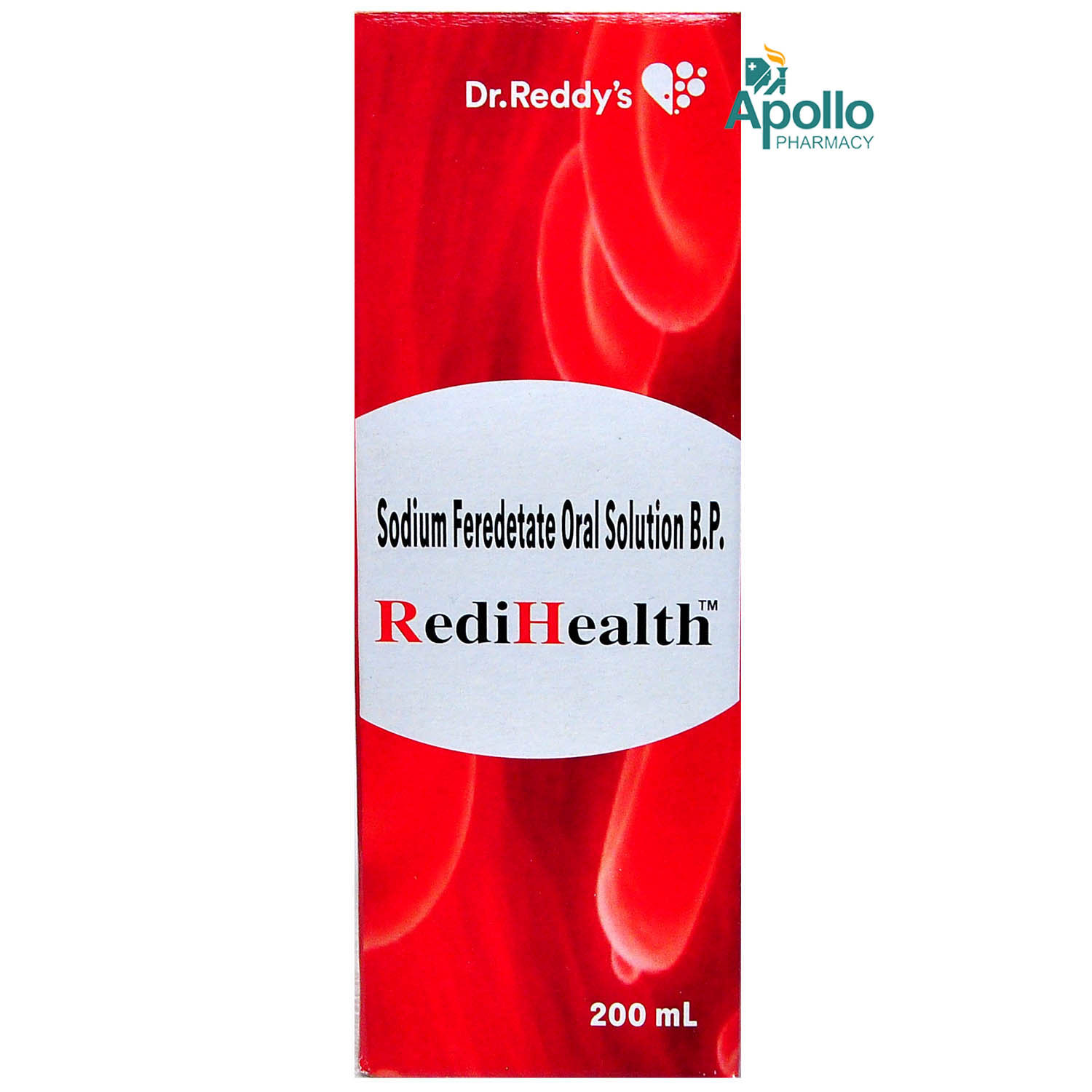
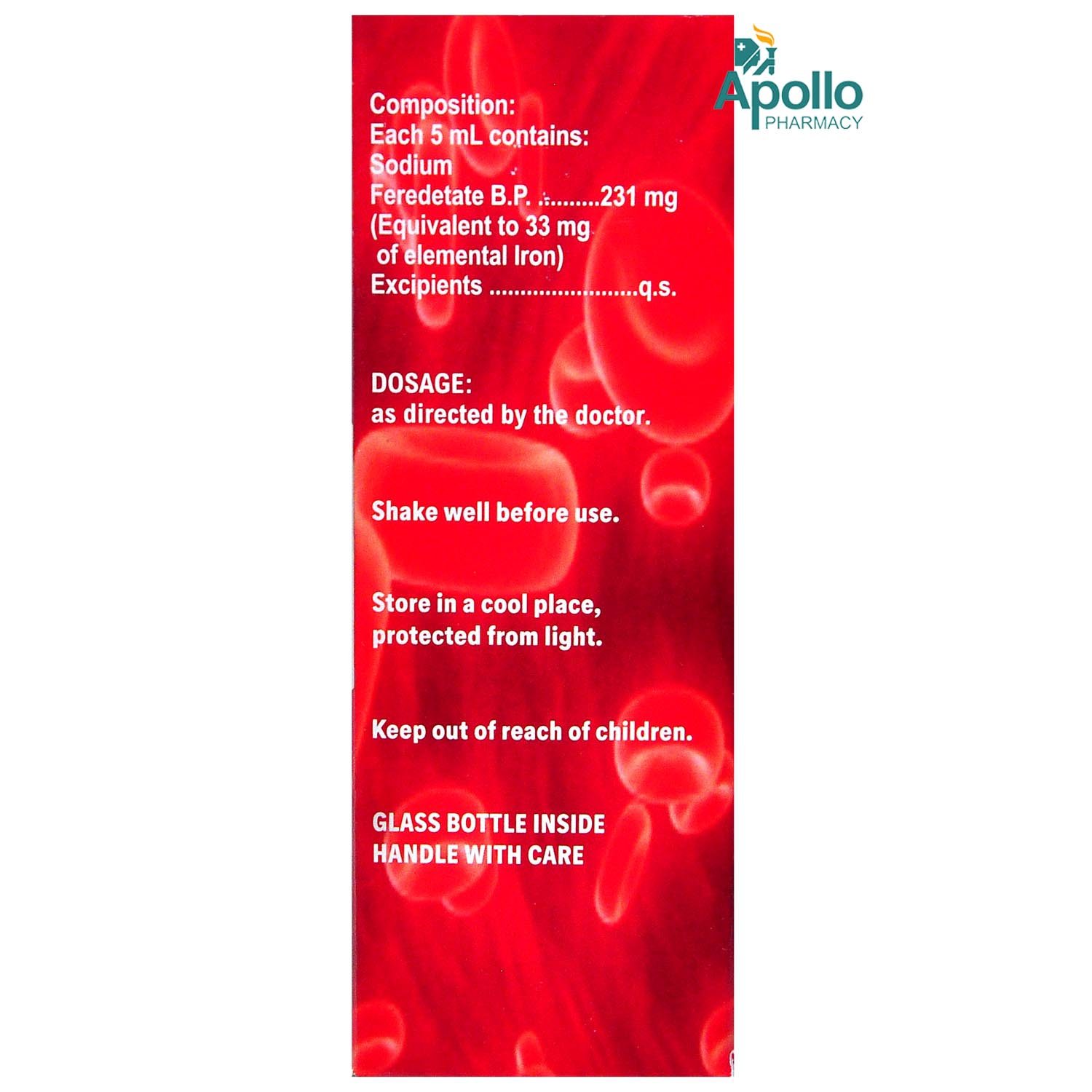
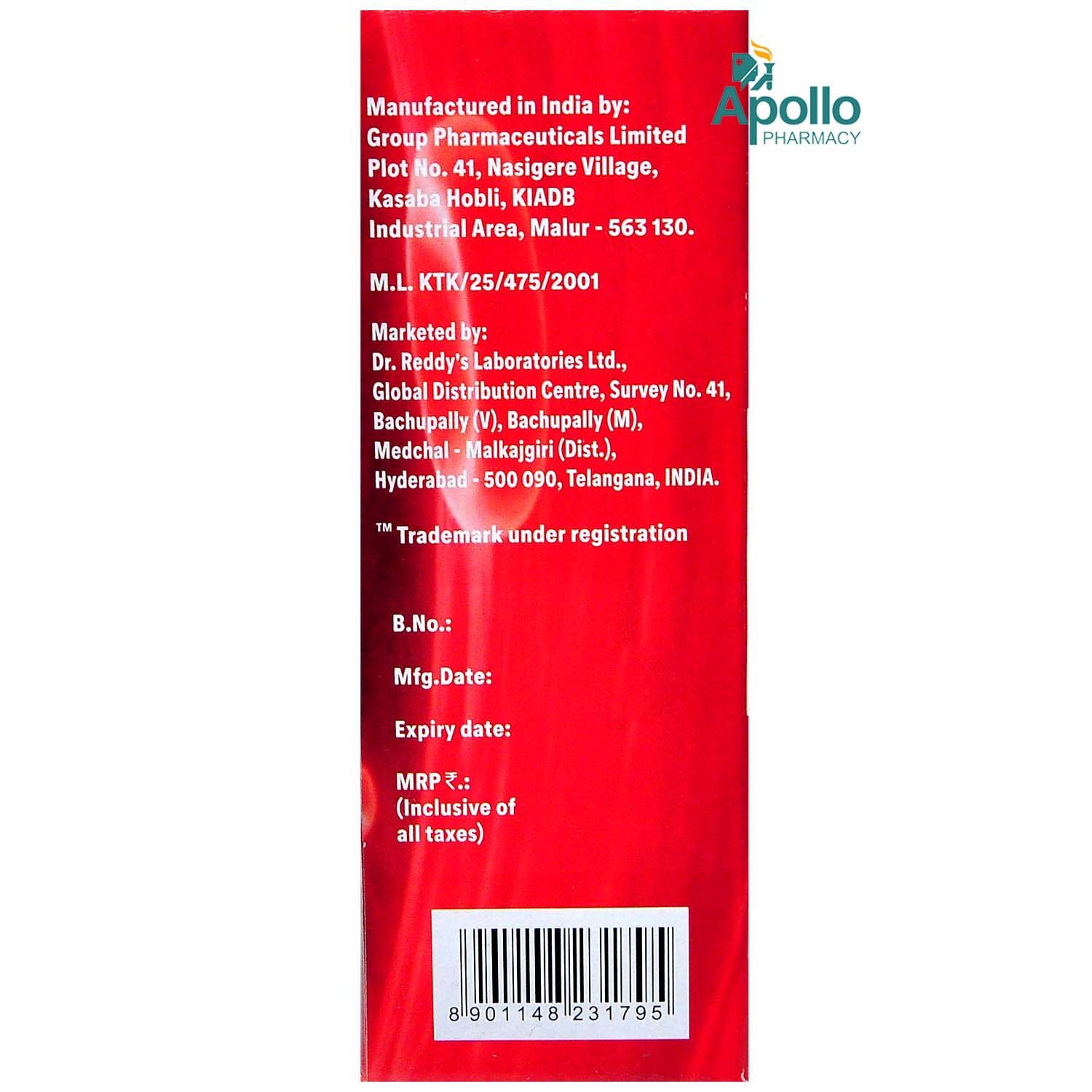
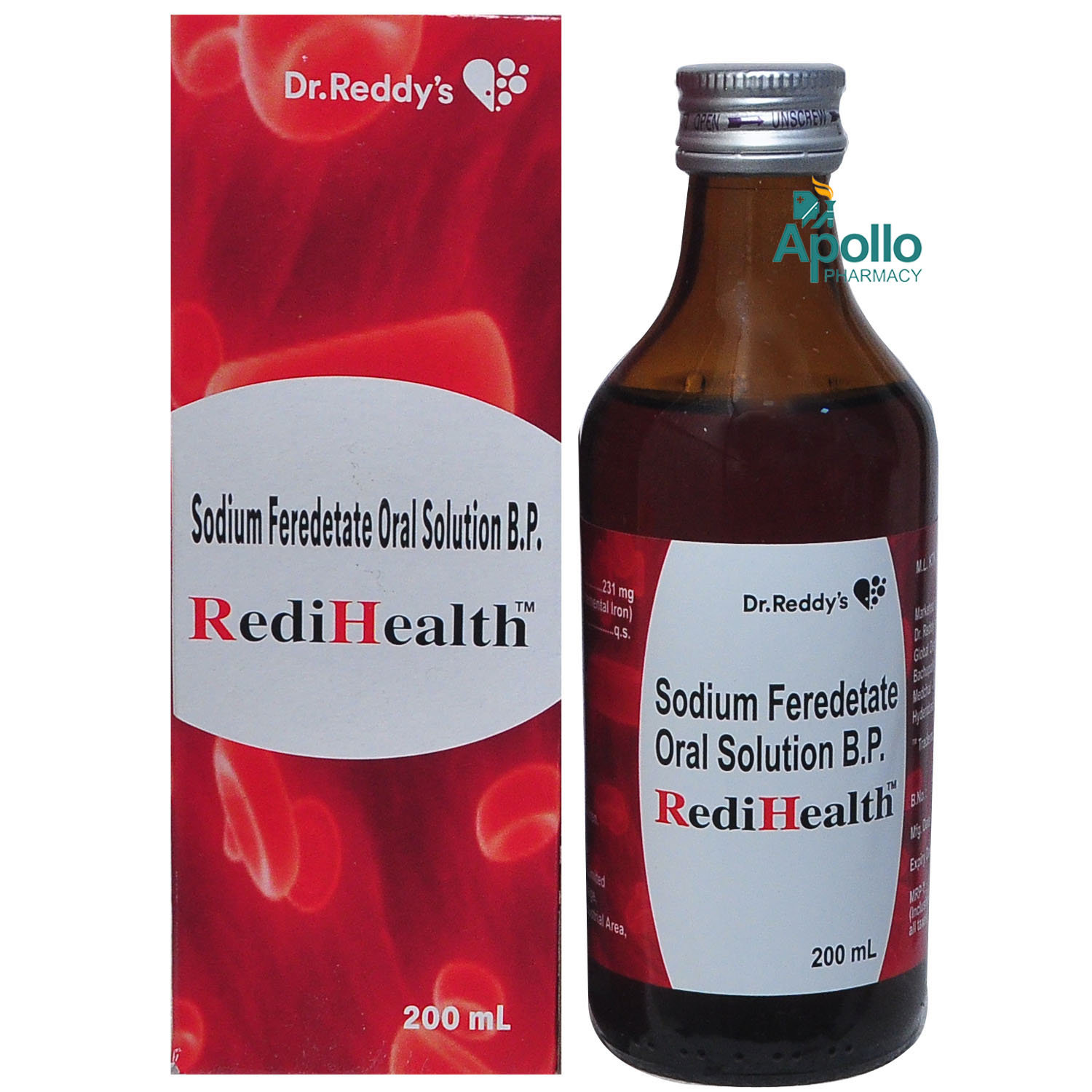













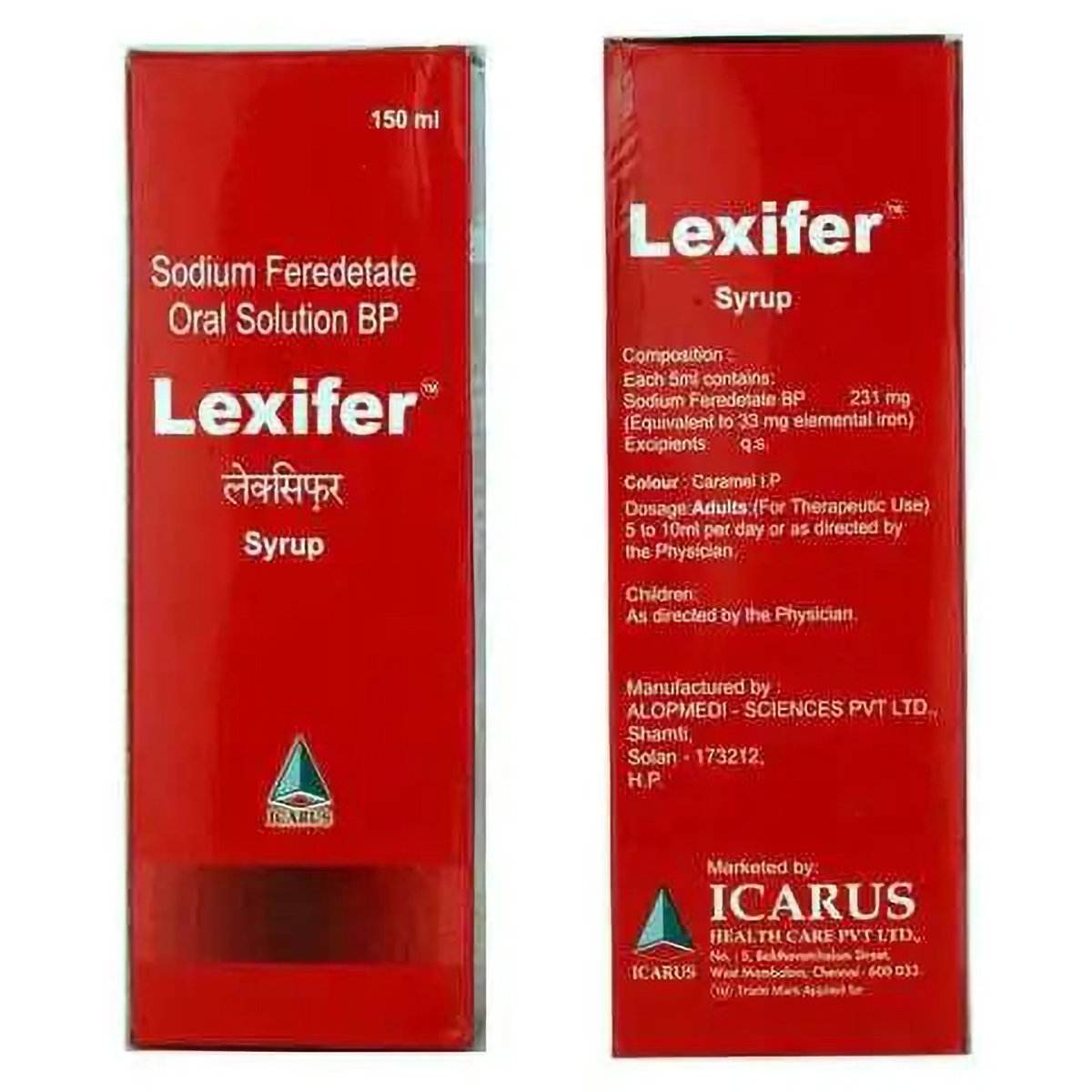

_0.jpg?tr=q-85)



